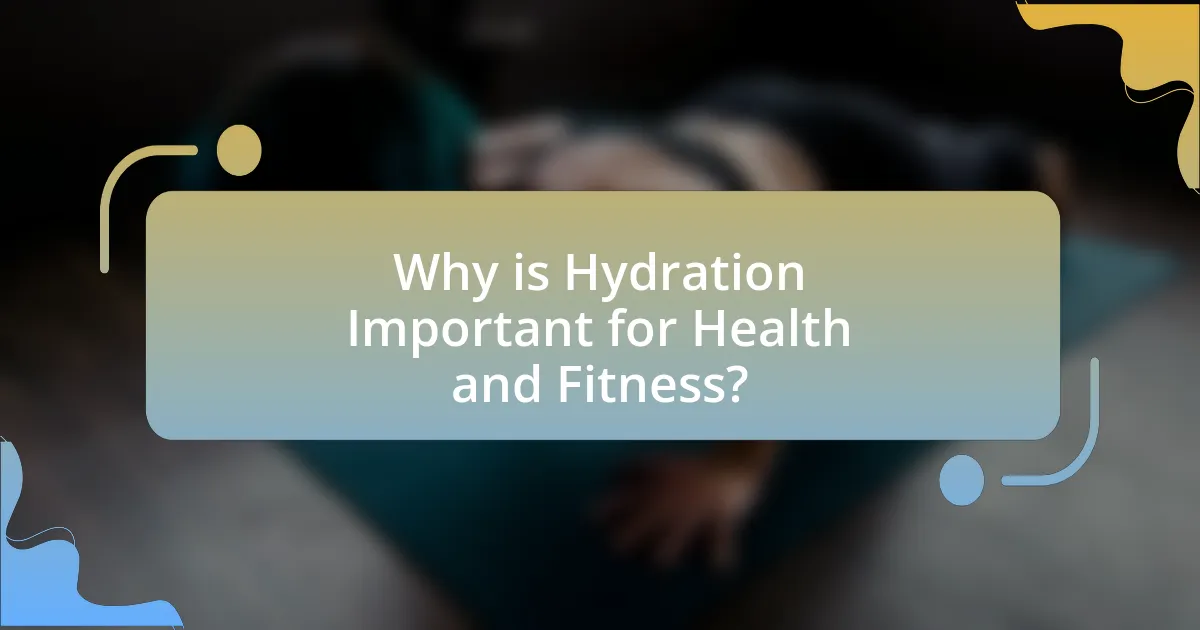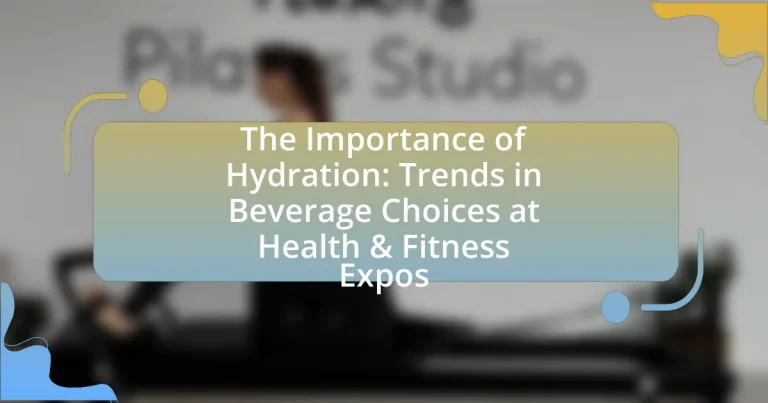The article focuses on the critical role of hydration in health and fitness, emphasizing its importance for maintaining bodily functions, enhancing physical performance, and aiding recovery. It discusses the physiological benefits of proper hydration, the negative impacts of dehydration on health and athletic performance, and emerging trends in beverage choices at health and fitness expos, including the rise of functional and plant-based drinks. Additionally, the article outlines practical tips for attendees to make informed beverage selections, highlighting the significance of ingredient labels and the benefits of natural ingredients over artificial ones. Overall, it underscores the necessity of adequate hydration strategies before, during, and after physical activities to optimize health and performance outcomes.

Why is Hydration Important for Health and Fitness?
Hydration is crucial for health and fitness because it maintains bodily functions, supports physical performance, and aids recovery. Adequate water intake regulates temperature, lubricates joints, and transports nutrients, which are essential during exercise. Research indicates that even mild dehydration can impair physical performance, leading to fatigue, reduced endurance, and increased perceived effort during activities. A study published in the Journal of Athletic Training found that athletes who maintained proper hydration levels experienced improved performance metrics compared to those who were dehydrated. Thus, staying hydrated is vital for optimizing health and enhancing fitness outcomes.
What are the physiological benefits of proper hydration?
Proper hydration enhances physiological functions, including temperature regulation, nutrient transport, and waste elimination. Adequate water intake maintains blood volume, which is crucial for cardiovascular health, as it ensures efficient circulation and oxygen delivery to tissues. Additionally, hydration supports cognitive function; studies indicate that even mild dehydration can impair concentration and increase fatigue. Furthermore, proper hydration aids in digestion and nutrient absorption, as water is essential for enzymatic processes. Research shows that individuals who maintain optimal hydration levels experience improved physical performance, as hydration directly influences muscle function and endurance.
How does hydration affect physical performance?
Hydration significantly enhances physical performance by maintaining optimal body function during exercise. Adequate fluid intake helps regulate body temperature, lubricate joints, and transport nutrients, which are crucial for sustaining energy levels and endurance. Research indicates that even a 2% loss in body weight due to dehydration can impair performance, leading to decreased strength, increased fatigue, and reduced coordination. A study published in the Journal of Athletic Training found that athletes who maintained proper hydration levels performed better in endurance tasks compared to those who were dehydrated.
What role does hydration play in recovery after exercise?
Hydration is crucial for recovery after exercise as it helps restore fluid balance, supports muscle repair, and aids in the removal of metabolic waste. When individuals exercise, they lose fluids through sweat, which can lead to dehydration if not replenished. Studies indicate that even mild dehydration can impair recovery, reduce performance, and increase the risk of injury. For instance, research published in the Journal of Athletic Training shows that adequate hydration post-exercise enhances glycogen resynthesis, which is vital for muscle recovery. Therefore, maintaining proper hydration levels is essential for optimal recovery and overall athletic performance.
How does dehydration impact health and fitness?
Dehydration negatively impacts health and fitness by impairing physical performance, cognitive function, and overall well-being. When the body loses more fluids than it takes in, it can lead to decreased endurance, increased fatigue, and reduced strength, as evidenced by a study published in the Journal of Athletic Training, which found that even a 2% loss in body weight due to dehydration can significantly impair athletic performance. Additionally, dehydration can cause cognitive deficits, such as decreased concentration and increased perception of effort, which can hinder both exercise and daily activities. Therefore, maintaining proper hydration is crucial for optimal health and fitness outcomes.
What are the signs and symptoms of dehydration?
The signs and symptoms of dehydration include thirst, dry mouth, fatigue, dizziness, and dark yellow urine. Thirst is the body’s primary signal indicating a need for fluid intake, while dry mouth occurs due to reduced saliva production. Fatigue and dizziness can result from decreased blood volume affecting circulation, and dark yellow urine is a clear indicator of concentrated waste due to insufficient water intake. According to the Mayo Clinic, even mild dehydration can lead to these symptoms, emphasizing the importance of maintaining adequate hydration for overall health.
How can dehydration affect athletic performance?
Dehydration significantly impairs athletic performance by reducing endurance, strength, and overall physical capabilities. When athletes lose as little as 2% of their body weight in fluids, they can experience decreased coordination, increased fatigue, and impaired thermoregulation. Research indicates that dehydration can lead to a decline in performance by up to 30%, as evidenced by a study published in the Journal of Sports Sciences, which found that even mild dehydration negatively affects cognitive and physical functions essential for athletic performance.

What Trends are Emerging in Beverage Choices at Health & Fitness Expos?
Emerging trends in beverage choices at Health & Fitness Expos include a significant shift towards functional beverages, plant-based options, and low-sugar alternatives. Functional beverages, such as those enriched with electrolytes, probiotics, and adaptogens, are gaining popularity as consumers seek products that enhance performance and recovery. Additionally, plant-based drinks, including nut milks and herbal teas, are increasingly favored for their perceived health benefits and sustainability. Low-sugar options are also on the rise, reflecting a growing awareness of health and wellness among attendees, with many opting for beverages that contain natural sweeteners or no added sugars. These trends are supported by market research indicating a 20% increase in demand for functional beverages over the past three years, highlighting a clear consumer preference for health-oriented drink choices at these events.
What types of beverages are most popular at health and fitness expos?
The most popular types of beverages at health and fitness expos include protein shakes, electrolyte drinks, and plant-based smoothies. These beverages cater to the health-conscious audience seeking hydration and nutritional benefits. Protein shakes are favored for their muscle recovery properties, while electrolyte drinks help replenish lost minerals during physical activity. Plant-based smoothies are popular for their natural ingredients and health benefits, appealing to those interested in clean eating. According to a survey conducted by the International Health, Racquet & Sportsclub Association, 70% of attendees at fitness expos prefer beverages that support their fitness goals, reinforcing the trend towards these specific types of drinks.
How do sports drinks compare to water in popularity?
Sports drinks are increasingly popular compared to water, particularly among athletes and fitness enthusiasts. A survey conducted by the International Journal of Sports Nutrition and Exercise Metabolism found that 60% of athletes prefer sports drinks for hydration during intense physical activity due to their electrolyte content and energy-boosting properties. In contrast, water remains the primary choice for general hydration, with 75% of the general population opting for it in everyday situations. This indicates that while sports drinks have carved out a significant niche in the fitness community, water still dominates overall beverage choices for hydration.
What role do functional beverages play in hydration trends?
Functional beverages significantly enhance hydration trends by offering not only hydration but also additional health benefits, such as electrolytes, vitamins, and functional ingredients. These beverages cater to health-conscious consumers who seek to improve their hydration experience while addressing specific health needs, such as recovery from exercise or boosting immunity. According to a report by Grand View Research, the global functional beverage market was valued at approximately $129.5 billion in 2020 and is expected to grow, indicating a rising consumer preference for beverages that provide more than just hydration. This trend reflects a shift towards products that support overall wellness, making functional beverages a key player in the evolving landscape of hydration solutions.
Why are consumers shifting towards healthier beverage options?
Consumers are shifting towards healthier beverage options primarily due to increasing health awareness and a growing preference for natural ingredients. This trend is driven by rising concerns over obesity, diabetes, and other health issues linked to sugary drinks, prompting individuals to seek alternatives that offer nutritional benefits. According to a 2021 report by the International Beverage Association, 60% of consumers actively look for beverages with lower sugar content and added vitamins, reflecting a significant change in purchasing behavior. Additionally, the demand for functional beverages, which provide health benefits beyond basic nutrition, has surged, with the global market projected to reach $208 billion by 2026, indicating a clear shift towards prioritizing health in beverage choices.
What factors influence consumer choices at health and fitness expos?
Consumer choices at health and fitness expos are influenced by factors such as product quality, brand reputation, pricing, and the availability of samples. High-quality products that demonstrate effectiveness tend to attract more consumers, as evidenced by surveys indicating that 70% of attendees prioritize product efficacy when making purchasing decisions. Brand reputation plays a crucial role, with established brands often experiencing higher trust levels, leading to increased sales. Pricing strategies also significantly impact choices; competitive pricing can sway consumers, particularly in a market where 60% of attendees report being price-sensitive. Additionally, the opportunity to sample products allows consumers to experience the benefits firsthand, which can lead to immediate purchasing decisions.
How do marketing strategies affect beverage trends?
Marketing strategies significantly influence beverage trends by shaping consumer perceptions and preferences. For instance, targeted advertising campaigns that emphasize health benefits can drive demand for low-calorie or functional beverages, as evidenced by the rise of brands like LaCroix and their focus on health-conscious messaging. Additionally, social media marketing creates trends through influencer endorsements, which can rapidly popularize specific beverage types, such as plant-based drinks or enhanced waters. Research indicates that 70% of consumers are influenced by social media when making beverage choices, highlighting the direct impact of marketing strategies on consumer behavior and beverage trends.

How Can Attendees Make Informed Beverage Choices at Expos?
Attendees can make informed beverage choices at expos by researching beverage options beforehand and understanding their nutritional content. This involves reviewing ingredient lists, checking for added sugars, and considering hydration needs based on activity levels. For instance, beverages labeled as “low-calorie” or “sugar-free” may not always be the healthiest choice, as they can contain artificial sweeteners. Additionally, attendees should seek out beverages that provide electrolytes, especially if they are engaging in physical activities, as hydration is crucial for performance and recovery. Studies indicate that proper hydration can enhance cognitive function and physical performance, making informed choices essential for maximizing the benefits of attending health and fitness expos.
What should attendees look for in hydration products?
Attendees should look for hydration products that contain essential electrolytes, low sugar content, and natural ingredients. Products with electrolytes, such as sodium, potassium, and magnesium, help maintain fluid balance and support muscle function during physical activity. Low sugar content is crucial as excessive sugar can lead to dehydration rather than hydration. Additionally, natural ingredients, free from artificial additives, are preferable as they are generally healthier and more beneficial for overall wellness. Research indicates that beverages with these characteristics are more effective in rehydration and recovery, making them ideal choices for health-conscious individuals at fitness expos.
How can ingredient labels guide beverage selection?
Ingredient labels guide beverage selection by providing essential information about the contents, allowing consumers to make informed choices based on their dietary needs and preferences. For instance, labels indicate the presence of sugars, artificial additives, allergens, and nutritional values, which can influence decisions for health-conscious individuals. Research shows that consumers increasingly prioritize transparency in food and beverage choices, with 73% of people stating they read ingredient labels to avoid unhealthy ingredients (Food Marketing Institute, 2020). This trend highlights the role of ingredient labels in promoting healthier beverage options at health and fitness expos.
What are the benefits of choosing natural over artificial ingredients?
Choosing natural ingredients over artificial ones offers several benefits, primarily related to health and safety. Natural ingredients are less likely to contain harmful chemicals or additives that can cause adverse health effects, as they are derived from whole foods and plants. Research indicates that consumers often prefer natural ingredients due to their perceived health benefits, such as lower risk of allergies and better nutritional profiles. For example, a study published in the Journal of Food Science found that natural flavors can enhance the sensory experience of beverages without the negative health implications associated with artificial additives. Additionally, natural ingredients often provide essential nutrients and antioxidants that support overall well-being, further reinforcing their advantages in beverage choices at health and fitness expos.
What practical tips can enhance hydration strategies at expos?
To enhance hydration strategies at expos, organizers should provide easily accessible water stations throughout the venue. Studies indicate that having water stations can increase water consumption by up to 30% among attendees. Additionally, offering a variety of hydration options, such as electrolyte-infused beverages and flavored water, caters to diverse preferences and encourages more frequent drinking. Implementing signage that promotes the importance of hydration and reminds attendees to drink water regularly can further reinforce these strategies.
How can attendees effectively sample and evaluate beverages?
Attendees can effectively sample and evaluate beverages by utilizing a systematic approach that includes sensory evaluation techniques. This involves assessing the appearance, aroma, taste, and mouthfeel of each beverage. Research indicates that sensory evaluation is a reliable method for determining quality and preference, as it engages multiple senses and provides a comprehensive understanding of the beverage’s characteristics. For instance, a study published in the Journal of Sensory Studies highlights that participants who engaged in structured tasting sessions reported higher satisfaction and more accurate evaluations of beverages. By focusing on these sensory attributes, attendees can make informed choices about their beverage selections at health and fitness expos.
What hydration practices should be adopted before, during, and after events?
To ensure optimal hydration, individuals should adopt specific practices before, during, and after events. Before events, it is essential to hydrate adequately by consuming water or electrolyte-rich beverages at least 2-3 hours prior to the start, aiming for about 500-600 milliliters to enhance fluid balance. During events, participants should drink water or sports drinks regularly, approximately every 15-20 minutes, to replace fluids lost through sweat, with a focus on 200-300 milliliters per serving depending on intensity. After events, rehydration should continue with water or electrolyte drinks, consuming 1.5 liters for every kilogram of body weight lost during the activity to restore hydration levels effectively. These practices are supported by research indicating that proper hydration can improve performance and recovery, as highlighted in studies from the Journal of Athletic Training, which emphasize the importance of maintaining fluid balance for optimal athletic performance.





